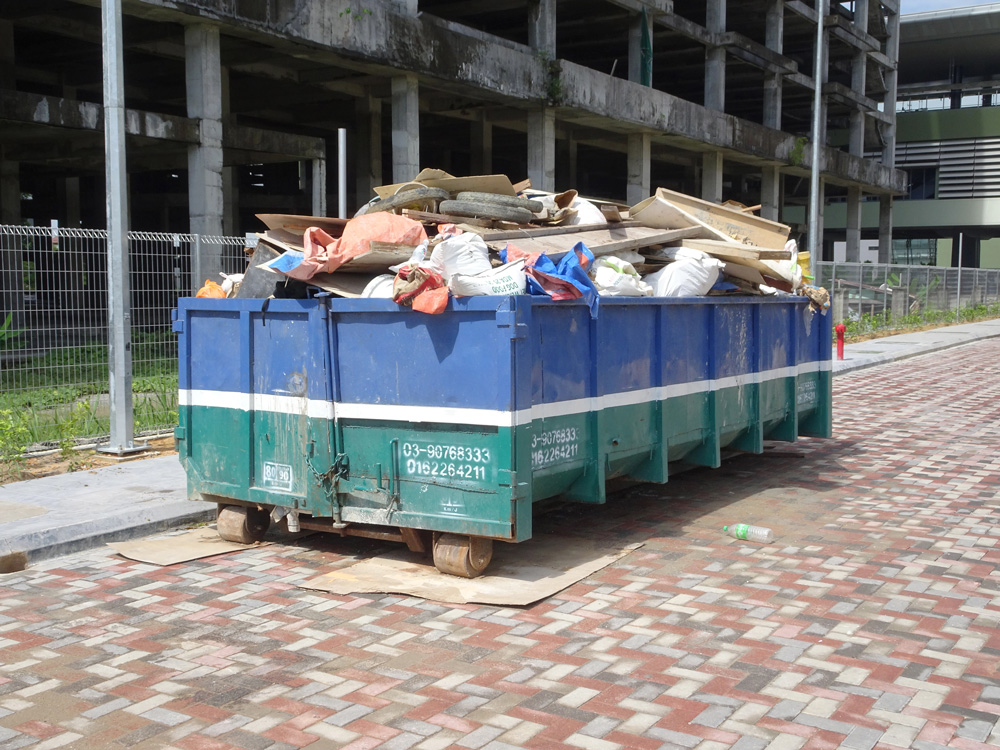
When you’re managing a construction project, one of the things you have to stay on top of is waste. The types of dumpsters you choose can impact your workflow, your budget, and even your compliance with local disposal rules. At Junk Veteran, we’ve worked with contractors, builders, and site managers who all face the same challenge—finding the right fit for the job. With so many options available, choosing the right one can feel like guesswork. That’s why we’ve put together this guide to help you sort through the most common options and understand how each one supports different project needs.
Roll-Off Dumpster for Construction Projects
These are one of the most common choices on construction sites because they’re built to handle heavy loads. Roll-off dumpsters come in different sizes and are delivered by trucks that can easily drop them off and pick them up when you’re ready. They’re open at the top, which makes them easy to fill with large chunks of debris like wood, metal, or drywall. You’ll usually find these being used for demolition, roofing, and major renovations. If you’re expecting bulky waste or high volume, this option gives you the space to keep the site clean and safe.
Front-Load Dumpsters for Construction Projects
If your project runs for a long period and produces consistent waste every day, this type might be the right fit. Front-load dumpsters are typically smaller than roll-offs, and they’re serviced on a regular schedule. The lids keep waste contained and rainwater out, which is especially helpful if you’re storing packaging, insulation, or other lightweight materials. Their compact size makes them ideal for tight spaces like downtown building sites. They’re also easy to position near your crew’s daily work zone for quick access.
Rear-Load Dumpsters for Construction Projects
Rear-load dumpsters have a different setup, where waste is loaded from the back rather than the front. These units can work well in areas where there’s limited clearance or where access is restricted. Because the design makes the back taller, it takes a bit more effort to load, but they do offer better reach for certain service trucks. On smaller projects or in urban settings, these dumpsters can be the better fit. If your job site doesn’t allow a front-load system, this alternative still gets the job done.
Compactor Dumpsters for Construction Projects
Some construction jobs generate large amounts of loose material that doesn’t stack well, like packaging foam or insulation sheets. A compactor dumpster helps reduce that waste by compressing it, which gives you more space to work with between pickups. This type is usually used on high-volume job sites or for projects that last several months. While they require electricity or fuel to operate, they help keep waste organized and reduce the number of trips needed to haul it away. If space or pickup frequency is an issue, a compactor can help you stay efficient.
Dirt and Concrete Dumpsters for Construction Projects
Heavy materials like soil, concrete, asphalt, or bricks call for something built to carry weight rather than volume. Standard roll-offs can’t always support the density of these materials, which is why there are specific dumpsters made just for them. These containers are shorter in height to make loading easier, especially when using machinery. They’re also used in excavation, foundation work, and road construction. If your job involves breaking or digging, you’ll want a dumpster built to take the load.
Yard Waste Dumpsters for Construction Projects
When your crew is clearing land or doing landscape-heavy work, yard waste dumpsters help keep things organized. They’re designed to take branches, brush, tree stumps, and similar debris. This type of dumpster keeps green waste separate from other construction materials, which helps with disposal regulations in many towns. If your project includes site prep or outdoor redesigns, this will keep the mess contained and easy to haul. It’s a clean way to deal with natural waste without clogging up your main dumpster.
Mobile Dumpsters for Construction Projects
Some job sites require flexibility as the work moves from one area to another. Mobile dumpsters, which are mounted on wheels or trailers, give you the freedom to move your container wherever it’s needed. These are perfect for large properties or staged builds where the action doesn’t stay in one spot. You won’t need to wait for a pickup and redelivery—just tow it to the next area. If your crew is constantly shifting locations, this setup helps keep the flow moving without added delays.
Specialty Dumpsters for Construction Projects
Some materials can’t go in a regular dumpster because of local regulations or safety concerns. In these cases, you’ll need a specialty dumpster designed to hold items like asbestos, contaminated soil, or industrial byproducts. These containers meet specific handling and transport guidelines to keep your site compliant. If your project includes materials that fall into this category, don’t risk mixing them in with general debris. Having a dedicated dumpster for restricted waste keeps you covered and avoids delays.
Book the Right Dumpster with Junk Veteran
You know your project better than anyone, and now you know what types of dumpsters work best for each kind of job. Choosing the right one means less mess, fewer delays, and a smoother day on-site. At Junk Veteran, we make the process easy from start to finish. With over 20 years of experience in the Greater Boston area, we offer same-day dumpster and junk removal services, transparent pricing, and dependable support. Reach out to us today, and let’s get your job site running clean and stress-free.

